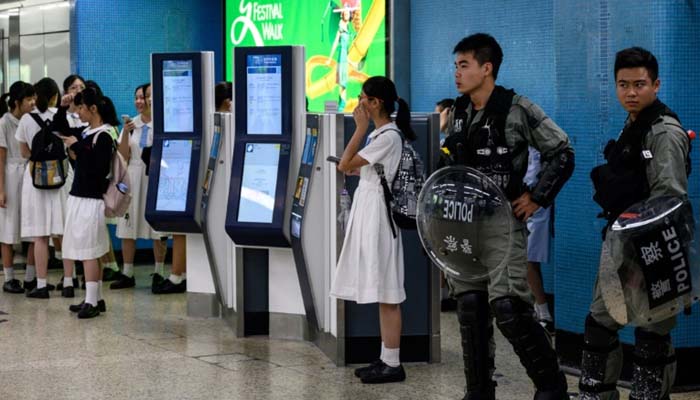TRENDING TAGS :
Hong Kong protesters call student boycott, strike after weekend of violence
The global financial hub is in the grip of an unprecedented crisis as a largely leaderless movement has drawn millions on to the streets to protest against what they see as an erosion of freedoms and increasing interference in their affairs by Beijing.
Hong Kong: Hong Kong pupils made human chains at schools early Monday and protesters disrupted rush-hour trains as the city's pro-democracy movement returned to action after a weekend which brought some of the worst violence in three months of anti-government protests.
The global financial hub is in the grip of an unprecedented crisis as a largely leaderless movement has drawn millions on to the streets to protest against what they see as an erosion of freedoms and increasing interference in their affairs by Beijing.
ALSO READ: Hanuma Vihari, Ajinkya Rahane take India closer to series sweep
China, which stands behind Hong Kong's government, has reacted with intimidatory tactics, including pressure on the city's businesses and well-publicised troop movements and exercises near the border.
An editorial late Sunday on Xinhua, the state news agency, warned "the end is coming" for the protest movement, without giving further details.
Early Monday protesters dressed in their signature black stood at doorways of trains, stopping them from closing, at a series of stations on the underground system, briefly disrupting an arterial network that has become a target of their activities.
Shortly afterwards, secondary school pupils formed human chains outside a number of government schools before classes began.
Some wore gas masks, helmets and goggles -- the now essential kit carried by protesters during months of tear gas-enveloped rallies and clashes with police.
At one school the bronze statue of Sun Yat-sen, the Hong Kong-educated powerhouse of Chinese political thought, was also fitted with a gas mask and goggles.
A few dozen pupils risked disciplinary action at school to attend a rally in the city centre.
"Hong Kong is our home... we are the future of the city and have to take up responsibility to save it," said a 17-year-old secondary school student who gave her surname as Wong.
Hong Kong is a semi-autonomous southern Chinese city that operates under a "one country, two systems" framework, which gives citizens rights unseen on the mainland.
China committed to giving the people of Hong Kong those rights in an agreement that saw the city return from British colonial rule in 1997.
China's erosions of those rights has been one of the driving forces behind the protest movement.
Another 17-year-old pupil named Cheung recognised the importance of study but reasoned "if a city no longer has freedom, we can't speak our own views.. then academic achievement is not important."
Protesters also called for a general strike on Monday - although there were few immediate signs of it biting - while university students are due to rally in the afternoon.
The protests started in opposition to government plans to allow the extradition to the mainland of people wanted by Beijing, but have widened to include broader demands.
These include demands for the extradition bill to be formally scrapped and for an independent inquiry into alleged police brutality during the protests.
The protesters also want the city's leader and all its lawmakers to be directly elected, scrapping the current system that heavily favours the Chinese government.
Monday's round of protest actions followed yet another weekend of violence on the streets as well as efforts by protesters to disrupt the city's airport, one of the busiest in the world.
On Sunday at least a dozen flights were cancelled after protesters blocked routes to the airport, although police fended off demonstrators' efforts to converge on the terminal itself.
On Saturday, hardcore protesters rampaged through the city centre, setting fires and throwing petrol bombs at riot police in defiance of a rally ban.
Police hit back with tear gas, baton charges and water cannon laced with chemical dye.
Video footage captured by local media showed police charge and beat a crowd cowering inside a train carriage, with Amnesty International calling their actions "horrifying".
The images have fortified anger against the police, who protesters accuse of brutality.
Universities were due to resume classes Monday after a summer break, but students -- who make up the backbone of the protest movement -- are planning a two-week boycott.
Protesters were also urging a general strike.
In early August, a city-wide strike -- a rare occurrence in a freewheeling finance hub where unions traditionally have little sway -- brought transport chaos to the city.
Hong Kong' flagship carrier Cathay Pacific has warned staff they risk being sacked if they joined Monday's strike after the last walkout was supported by the airline's flight attendant union.
Cathay has already fired at least four staff -- including two pilots -- for supporting the protests.
Hong Kong's reputation as a stable place to do business has been shaken by the ongoing protests.
Visitor arrivals have plummeted, hotel vacancies have soared and retailers have reported huge losses, but the government has offered little in the way of concessions or suggestions on how to end them.
ALSO READ: Hong Kong pro-democracy protesters target trains, urge general strike
(PTI)



